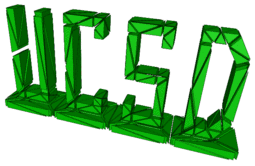| Michael Holst | ||
| https://ccom.ucsd.edu/~mholst/ |
Distinguished Professor of Mathematics and Physics UC San Diego |
|
|
Math 270C (Numerical Ordinary Differential Equations)
Course Topics: Numerical Ordinary Differential Equations Instructor: Prof. Michael Holst (5739 AP&M, mholst@math.ucsd.edu; Regular Office Hours: Mon & Wed 11-11:50am) Term: Spring 2017 Lecture: 10-10:50am MWF, 5402 AP&M TA: Francesca Grogan (5760 AP&M, fgrogan@ucsd.edu; Regular Office Hours: Wed 1:30-3:30pm) Discussion: None Main Class Webpage: http://ccom.ucsd.edu/~mholst/teaching/ucsd/270c_s17/index.html Textbook(s): A. Quarteroni, R. Sacco, F. Saleri, Numerical Mathematics, Second Edition, Springer-Verlag, 2000. Printable Syllabus: Can be found [ here ]. CATALOG DESCRIPTION: 270C. Numerical Ordinary Differential Equations (4) Theory of best approximation in normed spaces, orthogonal polynomial families, Galerkin and Petrov-Galerkin methods. Initial value problems (IVP) and boundary value problems (BVP) in ordinary differential equations. Linear methods for IVP: one and multistep methods, local truncation error, stability, convergence, global error accumulation. Runge-Kutta (RK) Methods for IVP: RK methods, predictor-corrector methods, stiff systems, error indicators, adaptive time-stepping. Finite difference, finite volume, collocation, spectral, and finite element methods for BVP; a priori and a posteriori error analysis, stability, convergence, adaptivity. Prerequisites: Math 270B or consent of instructor. COURSE INFORMATION: Many of the advances of modern science have been made possible only through the sophisticated use of computer modeling. The mathematical foundation of the computer modeling techniques now used in all areas of mathematics, engineering, and science is known as numerical analysis (sometimes referred to as computational mathematics, numerical mathematics, or scientific computing). The Math 270ABC series at UCSD provides a graduate level overview of some of the foundation topics in numerical analysis. The Math 270ABC sequence covers all of the material that appears on one of our core written qualifying examinations for the mathematics doctoral program at UCSD. Math 270A deals with various aspects of numerical linear algebra, including direct methods for solving systems of equations involving dense and sparse matrices, iterative methods for solving linear systems, and methods for solving eigenvalue problems. Math 270B focuses on numerical methods for solving nonlinear equations and optimization problems, and on classical and modern approximation theory as needed for analyzing numerical methods. Math 270C concentrates on bringing the tools from 270A and 270B together to develop numerical methods for solving initial value problems (IVPs) and boundary value problems (BVPs) in ordinary differential equations (ODEs). We will also cover some additional material on approximation theory that is needed for the ODE material. The topics in 270A and the first half of 270B may be viewed as preparation for Math 271ABC (numerical optimization), whereas the topics in the entire series, with emphasis on the topics in the second half of 270B and the topics in 270C, may be viewed as preparation for 272ABC (numerical PDE) and 273ABC (advanced techniques in computational and applied mathematics). GRADES, HOMEWORKS, EXAMS, AND IMPORTANT DATES: Course information, such as any homework assignments given out, exam dates, and so forth, will be maintained on this course webpage. Note that I sometimes make changes to the lecture schedule and homework assignments as the quarter progresses, depending on how far I get each week in the lectures. Therefore, check this webpage regularly. I will periodically (about every 2-4 weeks) give out homeworks to help you prepare for the final exam. Important dates:
Grading: To encourage you to do the homework problems, part of your grade in 270C will be based on your scores on the homeworks, together with your score on the final exam. Here is the weighting we will be using:
Working Together: You are permitted, and very much encouraged, to work on the homeworks together, including writing up your solutions to the homeworks. However, keep in mind that your final exam is done individually, so you need to make sure you can solve the homework problems yourself by the time of the final exam. (In my experience, it is easy to convince yourself that you understand how to solve a problem, but unless you actually write it all out carefully, many times you find that you do not completely understand things without writing it out.) List of Homework Problems Assigned:
Study tips for the Final Exam: I strongly encourage you to take advantage of our excellent TA in preparing for the final. She will work out the details of any homework problem you ask her to solve, including problems on the sample final exam I am posting below. PRACTICE/SAMPLE FINAL EXAM is posted [ here ] Solutions (or sketches of solutions) to the problems are posted [ here ]. NOTE: This is a little longer than the final exam you will see next week, but I wanted to give you a sample problem on each of the main topics of the class. (Some of these are a bit challenging, but most should be doable.) |
